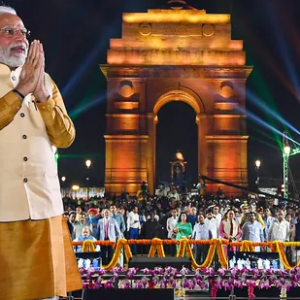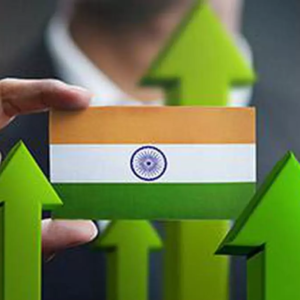 The 3rd International Dharma-Dhamma Conference on the theme ‘Harmony of Religions: Welfare of Humankind’ was held at the Brilliant Convention Centre in Indore from 24 October, 2015 to 26 October, 2015. This was jointly organized by the Department of Culture, Government of Madhya Pradesh; Sanchi University of Buddhist-Indic Studies (SUBIS), Bhopal and the Centre for Study of Religion and Society (CSRS) of India Foundation, New Delhi as a prelude to the Simhastha- 2016.
The 3rd International Dharma-Dhamma Conference on the theme ‘Harmony of Religions: Welfare of Humankind’ was held at the Brilliant Convention Centre in Indore from 24 October, 2015 to 26 October, 2015. This was jointly organized by the Department of Culture, Government of Madhya Pradesh; Sanchi University of Buddhist-Indic Studies (SUBIS), Bhopal and the Centre for Study of Religion and Society (CSRS) of India Foundation, New Delhi as a prelude to the Simhastha- 2016.
In this 3-Day International Conference, along with the main session, topics pertaining to Global Peace, Environment and Nature, Gender Equality, Religious Pluralism, Knowledge, Moral and Spiritual Values were discussed in different sessions. Religious gurus and noted Scholars discussed mainly on: Religion as a means of global peace, Role of religion in ecological balance, Religion promoting gender equality, Religion to safeguard human dignity, Religion to ensure social justice, Religion propagating moral and spiritual values, Religious pluralism, Development of Yogic traditions in different religions, Significance of knowledge in religion. Religious scholars from India, Southeast Asia, America and Europe presented research papers on the conference’s theme.
In his welcome speech, Hon’ble Chief Minister of Madhya Pradesh, Shri Shivraj Singh Chouhan stated that through religion solution of the world’s problems is possible. He further reiterated that outcome of this conference will be received in form of nectar that may be helpful to resolve the problems of suffering humanity. He also told that government is quite determined to provide adequate space to the nations that are interested to establish their academic centres at Sanchi University of Buddhist-Indic Studies (SUBIS).
The Hon’ble Chief Guest of the ceremony and Lok Sabha Speaker Smt. Sumitra Mahajan said that Simhastha is a grand assembly of thoughts and stressed that the outcome of this conference would be helpful to us in deciding our course of life.
The Special Guest, Hon’ble Foreign Minister of Bhutan Shri Lyonpo Damcho Dorji highlighted that it is imperative to find the ways to make religion as an alternative for welfare of mankind. Praising India’s religious diversity, he said that in the world’s biggest democracy people of different religions have been living together for centuries. “India is the birthplace of the world’s four major religions — Hinduism, Jainism, Buddhism and Sikhism — and people belonging to these religions have been living together in India for centuries.
Keynote Speaker Shri Bhaiyyaji Joshi, RSS Sarakaryavah emphasized the need of mutual cooperation and interdependency. Joshi said that one should have ‘respect’ for all religions and adopt principles of non-violence.
The inaugural session was followed by a special session chaired by Shri Banagala Upatissa Nayaka Thero, President of Mahabodhi Society (Sri Lanka). In this session Rev. Baselios Mar Thoma Paulose II, Head of Malankara Orthodox Syrian Church (Kerala) addressed the gathering and stated that he is personally against the forcible religious conversion. He considered communication is very important element for any community and put emphasis in the relevance of organization of conferences like as Dharma-Dhamma in keeping religious intolerance aside.
Eminent personalities like Swami Paramatmananda Saraswati of Arsh Vidya Mandir Rajkot, Swami Vishveshwaranand of Sanyas Ashram, Prof. Sadhvi Chaitnya Pragya from Jain Vishwa Bharati University Prof. Sun Keun Kim, Dongguk University, S. Korea H. H. Joseph Marthoma Metropolitan, Head Marthoma Sabha, Kerala and other dignitaries discussed issues related to tolerance and harmony. Swami Sukhabodhananda, Founder and Chairman, Prasanna Trust mesmerized the gathering with his interesting and thought provoking talk. He told that just our daily lives’ religion has become mechanical.
Shri Shivaraj Singh Chouhan, in his public speech, highlighted the importance of Simhastha and termed it as a grand assembly of thoughts. He stressed that along with GDP, benefits of development should be provided to common man.
Swami Avdheshanand Giri Maharaj, Acharya Mahamandaleshwar, Juna Akhara, Mr. Champika Ranawaka, State Minster of Megapolis and Western Development, Government of Sri Lanka, Prof. Geshe Ngawang Samten, Former VC, Central Tibetan University, Sarnath, Varanasi, Prof. David Frawley, Director, American Institute of Vedic Studies, USA and Shri Sultan Shahin, Founder & Editor, New Age Islam, India enlightened the audience on global peace and harmony through religion.
Mr. Oded Wiener, Advisor to the Chief Rabbinate, Israel stated that due to lack of dialogues there is chaos in the entire world. War cannot offer us solution for any problem. Rev. Sumana Siri, Buddhist Realists’ Centre, Singapore told that we can bring heaven on the planet through religion. He considered the present era as an era of digital disturbance. Prof. Vamsee Krishna Juluri, Professor of Media Studies, University of San Francisco, USA focused on the role of media in the welfare of mankind. Dr. Thich Nhat Tu, Deputy Rector, Vietnam Buddhist University, Vietnam stated that spiritual and ethical development of society is must. Dogmatic views neglect pragmatic values of other religions and it results into conflicts.
Dr. Kusum Jain, Professor (Retd.), Department of Philosophy, University of Rajasthan, Prof. Haiyan Shen, Shanghai University, China, Prof. Yasuo Kamata, Professor of Philosophy, Kwansei Gakuin University, Japan, Prof. Yajneshwar Shastri, Former Director of School of Philosophy, Psychology and Education, Gujarat University shared thoughts about unfolding richness and wisdom found in all the religions.


The Key Note speaker, world renowned spiritual Guru and founder of Art of Living Sri Sri Ravi Shankar remarked that in India social and individual welfare are never treated as different entities. There should be spiritualistic politics, secularize religion and socialize business. Spiritualise politics means that politicians and people in authority will have to have feelings for people, connection with people, a feeling of righteousness. He stated that the purpose of religion is purity in heart, clarity and quality in mind and sincerity in action. One should not keep quiet but spread the message of Dharma loud and clear in society for a one world family – ‘Vasudhaiva Kutumbakam’. Quoting from ancient Indian scriptures, he said differences of opinion and diverse ways of thinking can get one closer to ultimate reality and bring happiness and peace in the world.
Dr. Lobsang Sangay, Guest of Honour of the conference and Head of Central Tibetan Administration, Dharamshala earned the audience’ appreciation when he said that he came from the land of Manasarovar, an abode of Kailashpati Shankar. He elaborated the importance of 4C’s in life Compassion, Clarity, Co-operation and Co-existence. Hon. Sikyong began his speech by quoting H.H. the Dalai Lama, “My religion is simple. My religion is kindness” and underscored the importance of compassion as a core essence of leadership, giving a call to religious and political leaders to incorporate compassion in their official activities.




